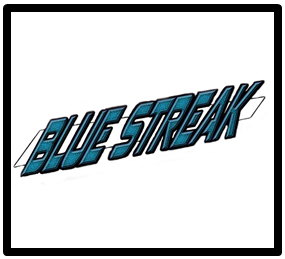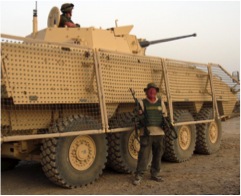 Virgil Huston’s poem “Valhalla” which will be featured in Blue Streak this November.
Virgil Huston’s poem “Valhalla” which will be featured in Blue Streak this November.
* * *
Valhalla
—Virgil HustonIn modern times
why do warriors fight
pointless and
counterproductive wars?Do they really believe
that Afghanistan is a
noble cause? Iraq?
That make us hated more
by those we try to rule.Is it just a job?
Do they even care?
Or would they fight anyone
the politicians send them to?
While the politicians stay at home.Are they brainwashed
or is there more?
They say only warriors
honorably killed in battle
receive the best reward.Do they wish to be received
by Odin in the Valhalla halls?
Or Freyja’s Folkvangr fields?
Or to Elysium where
the Greek heroes dwell?Yet in today’s world
only Muslims believe
in a heroes reward.
Heaven awaits the brave
with forty virgins each.Even the promises to warriors of
the Crusades are long forgotten.
The West has no traditions left
or the great rewards there are.
If we only remembered and believed.So, why do we fight these wars?
Brainwashed warriors have no place.
Pawns and puppets do no good
but fatten the pockets of
the Masters of War.And the warriors die for nothing.
Is there more? There is indeed much more to consider when one writes of war, of warriors, of meaning and reward, and Virgil Huston, a poet new to the MEA community, does not shy away from the tough questions in his poem Valhalla excerpted above, nor in the two other poetic works slated to appear in the next edition of Blue Streak: A Journal of Military Poetry.
A self-proclaimed “old hippie” who missed being drafted to Vietnam, but somehow wound up active duty Army during the Cold War, supporting both Desert Shield and Desert Storm as a civilian, seeing action in the Army National Guard in Iraq and working force protection in Afghanistan, Huston is no stranger to dark places, witnessing dark dealings, and grappling with dark emotions. Nevertheless, his quick intellect and irrepressible wit shine through in his food blog Cooking with Little Buddy, a mouth-watering tour of the more than 28 countries and cultures Huston’s savored over the years and his attempt at being positive no matter where you find yourself. And the difficult and ugly scars, the details, events, and emotions he’d rather not savor, but recognizes must be dealt with, he’s found a new channel for, and a kind of progressive healing and balancing space for—in poetry.
In a recent interview with Kathryn Broyles, Huston shared that while art in his life is nothing new (in addition to an extensive background in non-fiction writing, technical writing, and curriculum development, and future plans that include building a Tozan anagama wood-fired kiln for firing ceramics), poetry is new. Huston explained, “My first decent poem Afghanistan’s Flanders Fields was written at a tiny firebase in Ghazni Province, Afghanistan, where I could see about a km away the remains of a British cemetery from the 19th century. I later saw it up close on the way to an Observation Post….Afghanistan was an experience with widely varying extremes in terms of feelings” and its these feelings, and deep reflective consideration of them, that prompts Huston to use poetry to “try and cope with the conflicting feelings produced by what [he] was seeing and doing daily.”
When asked about influences and influencers, on his art and life, Huston quickly points to poet and lyricist Bob Dylan, and to sixties “war” music like Jimi Hendrix, Machine Gun, Buffy Sainte Marie (also Donovan) doing Universal Soldier, and Country Joe and the Fish at Woodstock with the I’m Fixin to Die Rag. Besides music, though, he’s just as quick to point to the support of his wife, to her honest and loving critique of his work, and to the people who actually inspired his poems- most of whom he’s never met. One particular individual whose feedback Huston points to as critical in shaping the poems in to appear in Blue Streak, especially Ramp Ceremony, is a former poetry editor for Journal of Military Experience, Wanda Fries. “A number of people have edited my work…and it is always better after someone looks at it and makes comments.”
While Huston has not yet been able to attend a MEA workshop or symposium, he hopes to do so in the future and he credits Jeff Stein formerly of The Washington Post and now of Newsweek, with putting him in touch with the gang at Military Experience & the Arts.
Huston’s advice to veterans, to anyone who’s not already writing: “I would say give it a shot…if a vet is interested at all in writing, they should be encouraged, get the opportunity to go to a workshop. They can see if it is something for them, and give it a try. Lot’s of us out here are willing to help. MEA is just one example and a great one.”
If you are a veteran with a story to tell and want help getting it onto paper, MEA can help. At the moment, our staff of close to three dozen educators, professional writers, and veterans’ advocates is working on the publication of nearly two-hundred original works of fiction, non-fiction, scholarship, art, and poetry by members of military communities throughout the world.
 Virgil Huston firmly believes writing gives us insight into ourselves and offers insight to others. It provides a sense of accomplishment and an opportunity to be heard. In addition to developing “specialized organic crop farming” on his 11 acres of SC countryside, and strategizing construction of his Tozan anagama wood-fired kiln, Huston plans to continue working actively to overcome PTSD and TBI issues, finish out his time in the Guard honorably, and hone his craft as a writer.
Virgil Huston firmly believes writing gives us insight into ourselves and offers insight to others. It provides a sense of accomplishment and an opportunity to be heard. In addition to developing “specialized organic crop farming” on his 11 acres of SC countryside, and strategizing construction of his Tozan anagama wood-fired kiln, Huston plans to continue working actively to overcome PTSD and TBI issues, finish out his time in the Guard honorably, and hone his craft as a writer.
As a blogger, Huston wants to “change people’s ideas about food, agriculture and other cultures, including the cultures of those we fight.” As a poet, he hopes to work towards a collected volume of his work— seeking for his poetry too, to foster cultural understanding, to disrupt our view of the enemy, and ultimately, to “change war hawks into doves.”



